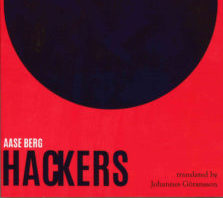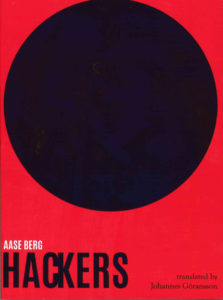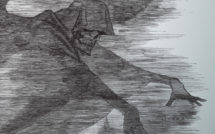

This is part of our special feature Facing the Anthropocene.
While passing through the experience of reading Aase Berg’s Hackers – recently out from Black Ocean, and brilliantly translated by Johanness Göransson – any reader might find themselves in an immediate state of abandon, gradually giving themselves over to dizzying motion, a spate of language-play, textures, and logics. And to ground oneself, a reader may have to accept various shifts in orientations: time, for instance, although crucial thematically to the text, constantly gels, hardens, and cracks apart, images do not stack or fit together easily, nor do speakers and dialogues progress linearly. But rather than create a series of disjunctive turns – pure spectacle – Hackers enacts its title in a way, inhabiting the reader and directing them, with a certain degree of swagger, toward its many inquiries. It’s true that the book dispenses with force, but if the language bears force it’s not the over-determined kind; instead, it moves unapologetically through various stages of hunger, arriving at resting points rather than states of knowing: “If you can’t handle me, it’s your problem…I move around the world and just am: Ich bin Alma!”
Because once I did acclimate myself to the book’s distinct entropy, there was (at least for me) a kind of clearing away, a realization that what I had been experiencing was a gradual degeneration, a metabolizing (cannibalizing?) of various bodies in language, a gradual breaking down of the mechanisms inside those bodies. The brilliance of Hackers is the way this invasive act becomes so pervasive in the book, at times ferocious and at times almost serene. And though Berg takes on various bodies: patriarchical, literary, ecological – there is no attempt to regenerate or redeem these bodies. Instead, the book seems to suggest that this half-state, this state of parasitic decay and even collapse is where we are living now – “…Penthesilea didicilis: the blinding, shady and unseen terminator” – and perhaps there is a new kind of sustenance and growth to be found here.
One of the things I found to be most interesting and most challenging about Hackers was its dialogue with the natural world. Aase Berg, one of the members of the radical Stockholm Surrealist Group founded in the mid-80s, has always had an interest in French surrealism and more recently in contemporary natural science, and her poems have also held a dialogue with traditional Swedish poets (Martinson, Tranströmer), as well as avant-garde poets (Ann Jäderlund, for example). Because the Swedish avant-garde does not share the same attributes as the North American one (there is an emphasis on anachronistic, flowery imagery, for example), the influences embedded in the presence of natural imagery in the poems may not be apparent to some readers, but they are certainly there, and not without their own critiques/re-writings of those influences. While there can be a deceptive cleanness, bareness to the poems:
Rabbits stand
on two feet
Rabbits always land
on their feetThe rabbit grail is raised,
Let’s get wasted!Let’s get wasted
and refuse
our feet
there is also an insistent shift in perspective, even tone – here, the natural world cannot be contemplated passively, used as means for the speaking subject to reflect back on itself. Instead, the relationship between humans/animals, humans/environment is always being called into question, fused together, also viewed through different areas of cultural production. Rather than being portrayed as given or fixed, these relationships (and their links with various traditions) are constantly morphing and loosening, being occupied from the inside by Aase’s rich, haunting language: “The house master strikes / or doesn’t, / whether he strikes / or not, / he strikes.”
Take, for example, the figure of the horse in the book, which is maybe my favorite. At times, the horse is an object of desire (the speaker wants to contemplate/reach/be the horse), at times he brings out humor, and at times he reflects the speaker’s destructive tendencies:
It is a horse and it says No
But the human says Want you.
As the horse continues to appear in the poems, these dynamics elongate, and it becomes clear that horse does simply represent a serene, natural-setting upon which to project desires, but instead is part of the systematic process of hacking and being hacked (Aase introduces a Trojan horse to point toward this): “The horse is a shelter in which time stands still. / The sky reddens overhead in a peaceful murmuring. / But the horse is also a war machine, / the road a cloud, / the asphalt slackens, / time picks up.” And though the horse becomes a kind of unreachable figure, trapped somewhere between language and its referent – “Horse trudges heavily and slowly in muddy meadow. What does the Trojan horse smell in the mud. How is the timber horse’s contents grounded in the slower mud of the universe.” – it also brings to bear one of the book’s central concerns, which is a distance language seems to carry in its constant trafficking of desire, the distance between wanting and having: “Horses rush / The girls so young / Living life / as if / it were real.”
In an interview with 3:AM Magazine, Aase Berg has said that there was something about her work with the Stockholm Surrealist Group that lacked “the feministic perspective” that she later came to privilege in her work, and though I consider many of Aase’s books to be very exciting in how they explore feminism, I think Hackers does this in a particularly bold way. One of the other central figures, the “Hagg,” which is fashioned in part after Glenn Close’s role in “Fatal Attraction,” is one of the primary “hackers” in the book, and if we can think of the male body, the patriarchical part of the social body, as one of the bodies being hacked, the Hagg does this with stealth: “You can also / walk around the woods / and talk about / how old the trees are / Or take a nap / in a flannel shirt / …You can wake / in the middle of the night / into my eyes / without a future,” and also with humor and irony: “Now the sperms are dead / You don’t exist.” But what’s even more glorious, Hackers celebrates this figure with both fierceness – if the Hagg is cast away by society for her gender and age, the book hints at a “female freedom” that doesn’t strive to transcend the system – “There is of course a risk / she who fights dragons / for too long / becomes a dragon herself,” – but finds freedom in the constant hacking of what she’s already inside. And as the reader makes her way through the playful, at times severe language (Goransson’s translation maintains the brutal consonants and the neologisms of the original Swedish), it becomes apparent that this constant hacking can lead to strange forms of beauty and pleasure: “If you boil anything long enough, it will turn into steam, nothing remaining, transluscent horse corpses rearing in hot air.”
Reviewed by Alexis Almeida
Alexis Almeida grew up in Chicago. Her poems and translations have appeared or are forthcoming in The Brooklyn Rail, Gulf Coast, Prelude, Dusie, Flag + Void, Action Yes, and elsewhere. She is an assistant editor at Asymptote and a contributing editor at The Elephants. Her chapbook of poems, Half-Shine, is recently out from Dancing Girl Press, her translation of Florencia Castellano’s Propiedades vigiladas [Monitored Properties] is recently out from Ugly Duckling Presse, and her translation of Roberta Iannamico’s Tendal is forthcoming from Toad Press. She is the recipient of a residency from Yaddo. She recently spent the year living in Buenos Aires on a Fulbright research grant, where she has been compiling and co-translating an anthology of contemporary female poets living in Argentina.
Hackers
by Aase Berg, translated by Johannes Göransson
Publisher: Black Ocean
Paperback / 216 pages / 2017
ISBN: 978-1-939568-21-2
To read more book reviews, please click here.
Published on May 2, 2017.




